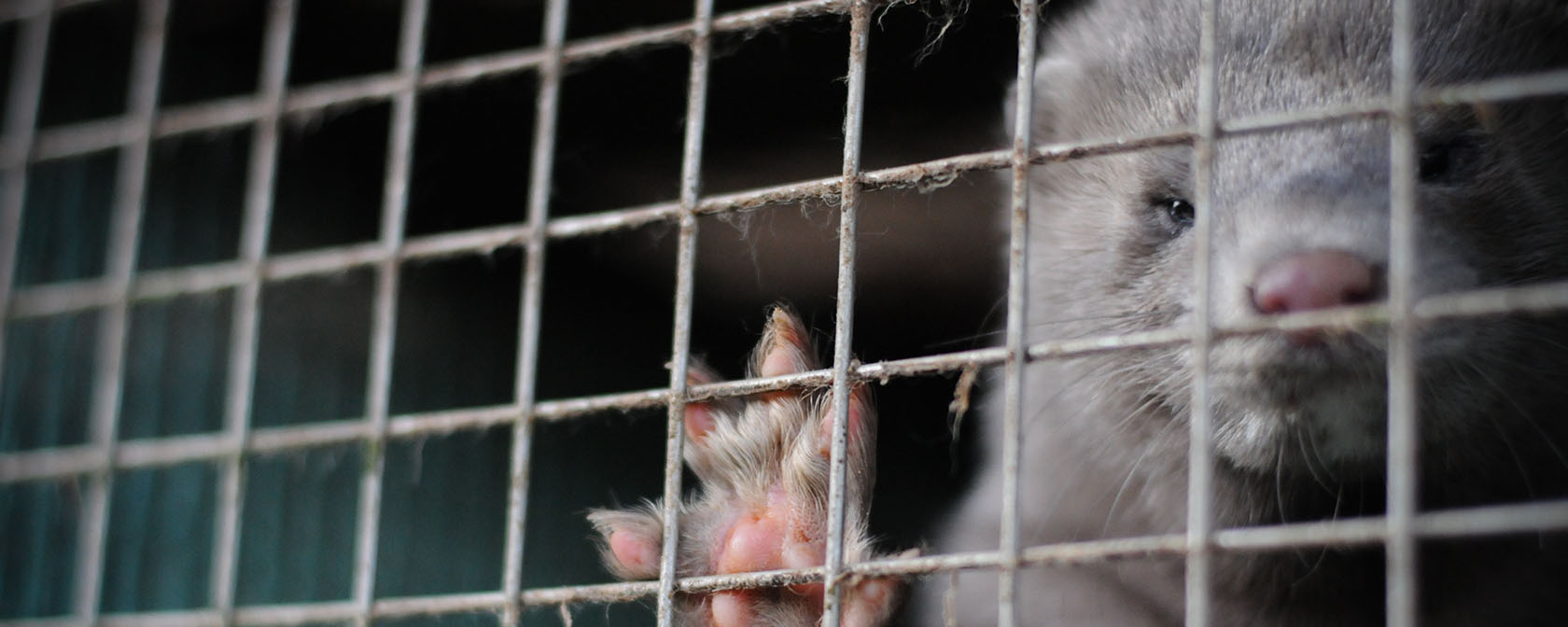By Sara Amundson and Kitty Block
Mink fur farms have emerged as hotspots for the coronavirus, with 11 nations in Europe, Canada and the United States reporting such infections and, in some cases, transmissions from animals to human workers. The infections have resulted in millions of animals, including pups, on fur farms being culled by gassing—a particularly cruel way to kill these semi-aquatic animals who can hold their breaths for long periods.
Despite this terrible tragedy, fur farms in many European nations are now gearing up to begin a new mink breeding season at the end of this month. If allowed to proceed, the number of mink on these farms could expand five-fold by May. U.S. fur farms are expected to begin breeding mink in spring as well.
This week, global health and food safety organizations issued warnings that mink fur farms are at high risk for spreading the coronavirus and should be monitored strictly as breeding season begins. The reports—one from the Food and Agriculture Organization of the United Nations, the World Health Organization and the World Organization for Animal Health (Europe), and the other from the European Food Safety Agency and the European Centre for Disease Prevention and Control—warn that in regions with a high density of fur farms, the virus is likely to spread from one mink farm to the next. The EFSA is recommending that EU member states implement precautionary measures, including testing of those who come into contact with mink, regular testing of samples from dead or sick animals, testing of wild mink captured near fur farms and genetic sequencing analysis for tracing the origins of outbreaks and identifying possible viral mutations.
It is great that these organizations are sounding the alarm on the grave coronavirus risk mink fur farms pose. But precautions are not enough—to truly end the pandemic risk, we need a proactive approach. EU member state governments and federal lawmakers in the United States—where four states have reported cases of infected mink—need to suspend all mink breeding immediately. Sweden has already taken action to do so on the grounds that allowing farmed mink to breed was a far too big a risk while the pandemic continues.
Mink are highly susceptible to the coronavirus and allowing the cages on fur farms to fill up again with new pups at a time when the pandemic continues to rage is foolhardy and dangerous. We already know that there have been outbreaks of the virus on fur farms in Spain, Greece and Poland that have had breeding animals only since the end of the pelting season in December.
The disease risk is especially high because of how cruelly the animals are treated and how tightly they are packed into these facilities, without any veterinary care. A Humane Society International investigation of mink fur farms in Finland in 2019 showed animals with eye infections and gaping wounds, including a mink with a large, bloody hole in the head. Some animals lay dead in the cages and others ate them or walked over them.
The pandemic has pushed some nations to move in the right direction and away from mink fur farming. The Netherlands, the first nation to report an outbreak on a mink fur farm, shut down all of its remaining fur farms several years before the end of a long-planned phase-out. France has announced plans to ban the fur trade and Denmark, in addition to Sweden, has suspended fur production.
In the United States, one state, California, has already banned fur sales, and six more have introduced legislation to do so. A bill in Hawaii passed a House committee 11-0 yesterday, showing that lawmakers are highly driven to end sales of this product that causes so much animal suffering.
Fur has already been in decline for years. As they have learned about the cruelty of fur production, major designers, retailers and consumers have turned away from it. Adidas just yesterday formalized its long-standing ban on fur by signing the Fur Free Alliance’s Fur Free Retailer program, joining other fur-free brands like Armani, Gucci, Prada and Hugo Boss. The pandemic has further highlighted that mink fur farming is not just a serious animal welfare problem—it is a dangerous public health risk. The sooner our leaders act to end this problem industry and the cruel product it peddles, the safer we will all be.
Kitty Block is President and CEO of the Humane Society of the United States.




